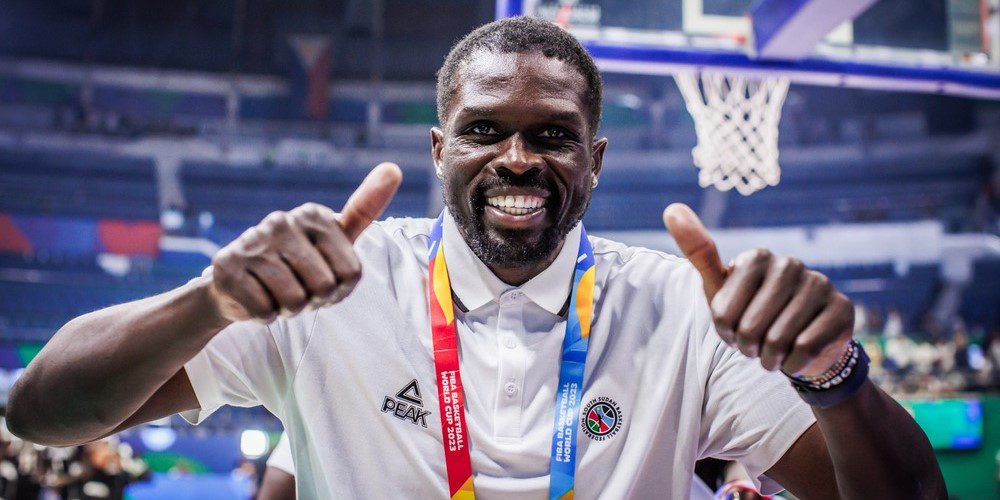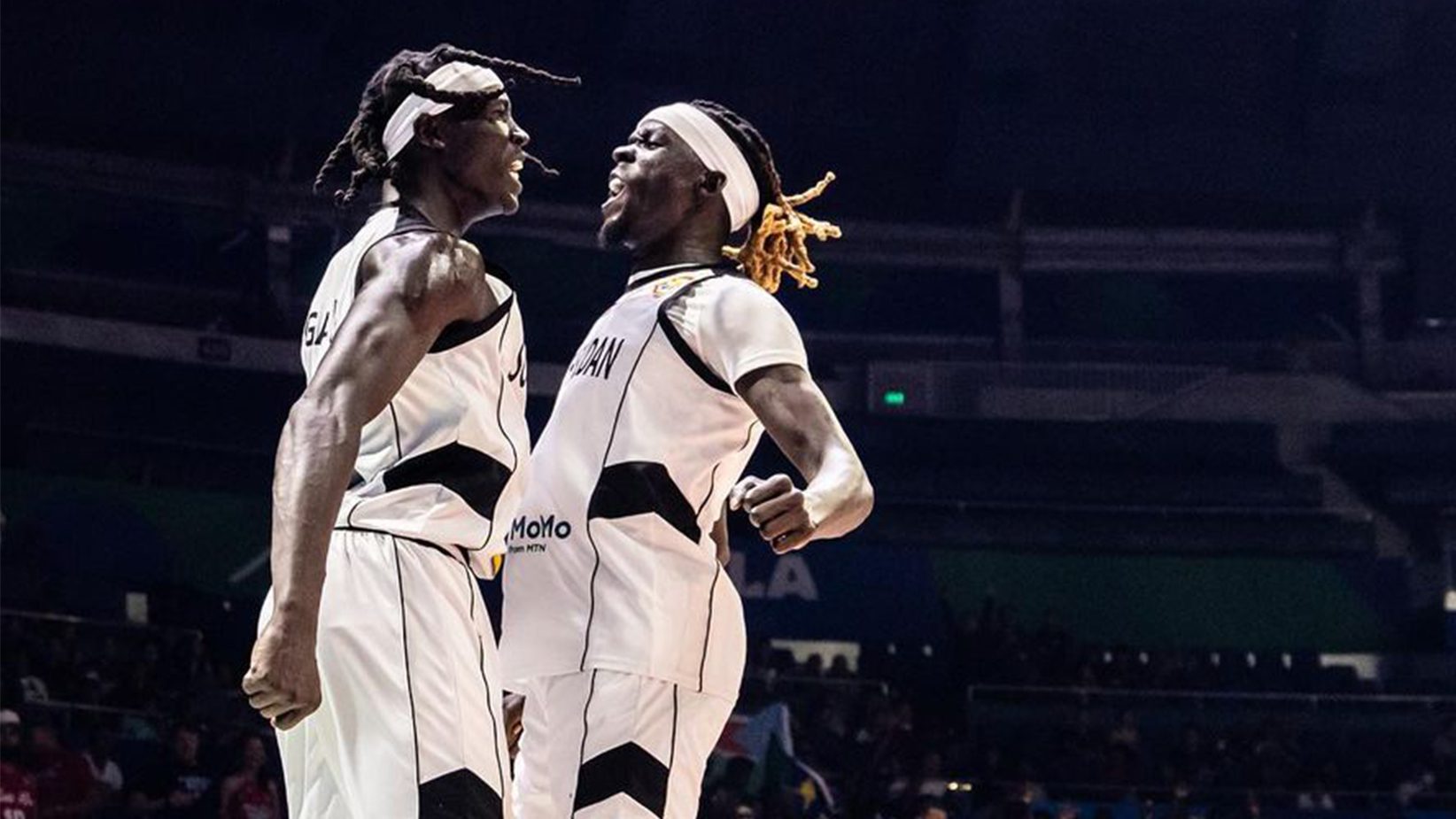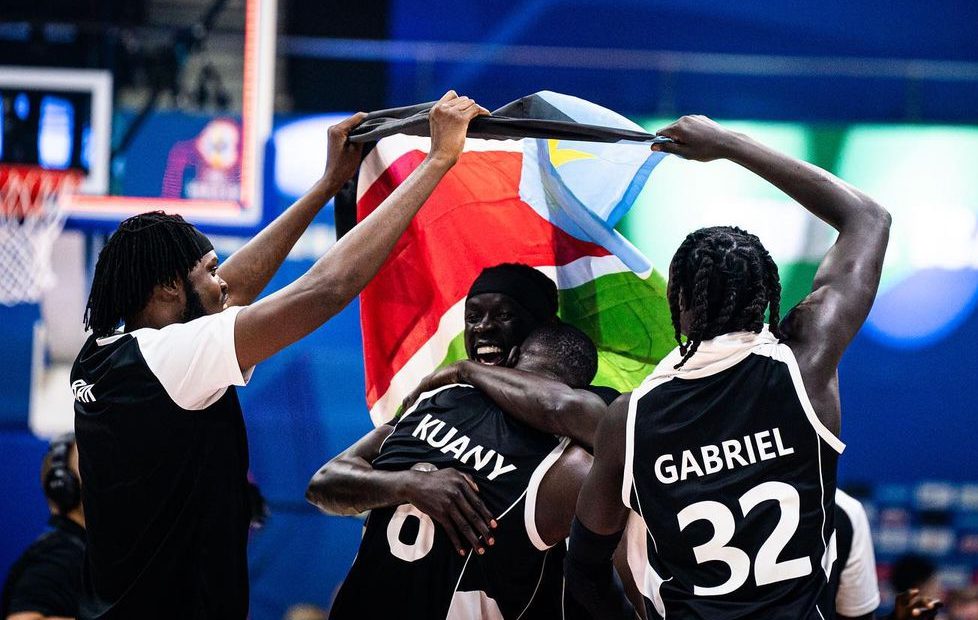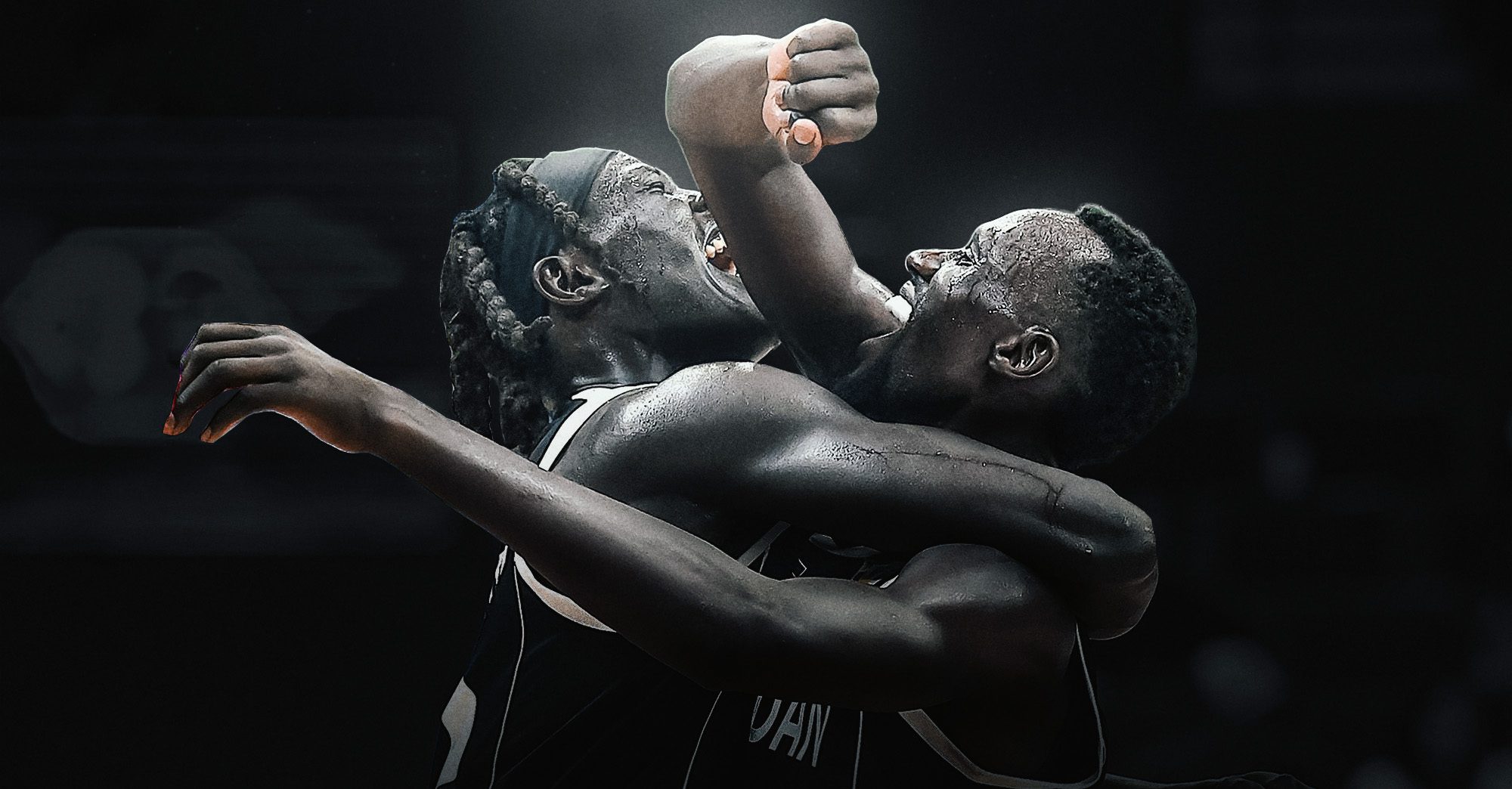It’s unquestionably one of the greatest underdog stories in sports. The South Sudanese national team, representing a war-torn country without a single indoor basketball court, is on the cusp of making its Olympic debut after rising from the lowest levels of African basketball.
Known as the Bright Stars, they made global headlines last week by coming within one basket of winning an Olympic warm-up game against the United States. South Sudan led by as many as 16 points and appeared on track for one of the greatest upsets in the history of the sport, before LeBron James took over late in the game and carried the U.S. to a 101-100 victory.
The near-win was almost as unlikely as the Bright Stars’ journey. South Sudan only gained independence from Sudan in 2011, making it the world’s youngest country. The national team had never competed in a major tournament until 2021. As recently as last year, they were practising outdoors on flooded concrete courts as eagles circled above their heads. Now, with a roster consisting entirely of refugees and the children of refugees, they are the first South Sudanese team in any sport to qualify for the Olympics.
“It still doesn’t feel real, even now,” captain Kuany Kuany told Basketball Forever earlier this year. “Like, every now and then, you just sit back and say to yourself, ‘Did we really do this?’”
The team’s rapid ascension stems from the tireless work of former NBA All-Star Luol Deng, who took control of the sport in his homeland five years ago as the president of the South Sudan Basketball Federation. Deng, who was also the head coach as recently as 2021 and still serves as an assistant, rebuilt the national team and funded it personally with the vision that it would exist to inspire hope, joy and unity in a country ravaged by war and divided by tribalism.

South Sudan consists of 64 tribes and these entrenched allegiances have led to deepening division and years of brutal conflict. By recruiting the best players available without a second thought for tribal affiliation, Deng’s mission was to dispel the very notion of tribalism.
According to South Sudanese humanitarian Elijah Manyok Jok, the team has already made tremendous inroads in fostering a sense of unity within the country.
“Everybody has been rallying behind this team,” Jok said in an interview with Basketball Forever. “People with tribal differences, people with political differences, all coming together. A true national team was our biggest missing link. Somehow in the past, we’ve had several different football teams, each one aligned with particular areas or tribes. And so the competition between them was actually reflecting the ongoing political and tribal differences in this country. But when the basketball team came in, it was a complete game changer. This team is one of the few sources of national identity we have. They have really planted the seed of social cohesion and harmony into the community.”
In an effort to build a competitive squad, Luol Deng spent years recruiting the best players he could find with South Sudanese heritage. But getting them into a Bright Stars jersey wasn’t always straightforward. Soft-spoken guard Sunday Dech, who was born in Ethiopia to South Sudanese parents, had to convince FIBA to allow him to play for South Sudan after previously representing Australia, his home since he was six years old. Kuany Kuany’s Finnish club threatened to let him go if he played through injury to represent South Sudan at the 2023 World Cup qualifiers. He packed his bags without hesitation and subsequently had his contract torn up.
Other players, such as 27-year-old center Deng Acuoth, were sceptical about playing for South Sudan in the first place, having watched grainy YouTube videos of the team’s early games in run-down gyms across Africa.
“Some of the guys were saying to me, ‘Yo, you should come play.’ I was like, ‘I don’t know, is the next tournament going to be played somewhere like that?’” Acuoth told BF. “But then I got a random call from an American number and it was Luol. I did not see that coming. You never expect someone like that to call you out of the blue. But he told me his vision, about how this was so much bigger than basketball, and that he wanted me on the team. Once he said that, I didn’t have a second thought.”
Eventually, South Sudan’s roster was brimming with world-class players, all of whom had overcome unthinkable adversity to forge careers in basketball. Peter Jok, who starred at the University of Iowa, lost both his father and grandfather in civil wars. His family fled from South Sudan to Uganda when he was young. Wenyen Gabriel, who has played 150 games in the NBA, was rushed from what is now South Sudan to Egypt as a two-week-old baby when his family fled the fighting. Majok Deng, one of the team’s most talented big men, left his childhood home at the age of six without telling anyone, embarking on a solo trip to follow his brother to a refugee camp in Kenya. He stayed there for four years before settling in Australia.
Beyond assembling the team’s talented roster, one of Luol Deng’s defining moves was appointing Houston Rockets assistant Royal Ivey as the team’s head coach. Deng met Ivey in 1999 when he moved to the United States on a basketball scholarship at New Jersey boarding school Blair Academy. He arrived at Blair with nothing to his name and didn’t even own a pair of basketball shoes. Ivey, a 17-year-old postgraduate student at the time, lent Deng his own sneakers and they became close friends overnight.
While the Bright Stars’ purpose always went beyond basketball, the players knew that to achieve the credibility and respect needed to make an impact off the court, they had to achieve something special on it. This served as their greatest motivation for making a run at qualifying for the World Cup and the Olympics.
However, that dream was shattered almost immediately. South Sudan stumbled at the very first hurdle on the way to reaching the world stage, failing to progress past the pre-qualifiers for the 2021 African championships, known as AfroBasket. The devastated players were at the airport, ready to fly home, when they were informed Algeria had withdrawn from the next round of qualifying due to a Covid outbreak. South Sudan had been offered the chance to take their place.
As a result, instead of jetting home to their families, the players boarded a flight to Rwanda for the next phase of AfroBasket qualifiers, where they did just enough to make it through to the AfroBasket tournament itself. The Bright Stars lost in the quarterfinals, but by making it to AfroBasket in the first place, they earned a spot in the qualifiers for 2023 FIBA World Cup.

With a host of new talent on board, including star forward Nuni Omot and former Philadelphia 76er Marial Shayok, the Bright Stars were ready when the World Cup qualifiers arrived. Playing exclusively against other African teams, they dominated the competition, finishing 11-1 and securing the country’s first World Cup appearance. South Sudan was the talk of the tournament, overwhelming their opponents with speed, athleticism, and three-point shooting. It was an unusual playing style for an African team, most of which prefer to slow the game down and make every possession a physical slog.
The Bright Stars led the qualifiers in scoring (78.6 points per game), field goal shooting (44.6 percent) and three-point shooting (37.6 percent). In the latter two categories, they were light years ahead of the competition. The team’s gunslinging, high-octane approach mirrored the style of play more commonly found in the Western nations where its players grew up, such as Australia, Canada and the United States.
“A lot of the other African teams used to say, ‘This style won’t work here, just wait until you move onto the next level,’” Kuany Kuany said. “Even recently, one of the Angola coaches was like, ‘Yeah, you guys have just been lucky.’ But we’ve been able to sustain it. It’s been working for us.”

Having proven themselves on their home continent, the World Cup presented the Bright Stars with a chance to show they weren’t only a force against African opponents unaccustomed to their style of play. They stumbled out of the starting blocks with early losses to Puerto Rico and Serbia. But they claimed thumping wins against China and the Philippines, before fittingly finishing their campaign with a 101-78 victory over rivals Angola to secure just one of 12 Olympic spots as the top-performing African team at the tournament. South Sudan’s World Cup may have been over, but their Olympic dream had just been realised. The win prompted emotional scenes on the court and in the stands, as the gravity of the moment began to sink in.
“It was just an outpouring of celebration and emotion after that game,” Marial Shayok told Basketball Forever. “Guys are celebrating with the fans, signing each other’s jerseys. It was a super cool moment, man, we were all just lost in it.”
View this post on Instagram
Starting point guard Carlik Jones, who was exceptional with 26 points and 15 assists in the win, was beaming with pride after the game. “It means the world, it means the world to the people back home,” Jones said.
Amid pure jubilation in the locker room postgame, Luol Deng yelled above the noise, “Where we going?” “Paris!” the players replied in unison, as the chant repeated on a loop.
Deng fought back tears when he addressed the media following the game.
“It’s an unbelievable story. It’s an underdog story that, not just for the South Sudanese, not just for Africa, but for the rest of the world,” Deng said. “It’s a feel-good story that the majority of people can relate to. It’s such a unique achievement because it’s beyond basketball.”
In conversations with Basketball Forever, many of the players were still processing the sheer scale of the team’s journey. Sunday Dech spoke to the surreal feeling of seeing the South Sudanese flag flying at the World Cup. Khaman Maluach, a 17-year-old Duke commit and projected top-three pick at next year’s NBA draft, said his entire experience with the national team felt like something out of a movie. Many players spoke of flying back to South Sudan with their teammates and being mobbed at the airport by thousands of fans.
The next step for the Bright Stars is the Olympics, where they have been drawn in the same pool as the United States and Serbia. Despite everything they’ve achieved, South Sudan will still be heavy underdogs. But that suits them just fine. They’ve known nothing else.
READ MORE: Giannis Can’t Play Or Function Without His Brother Thanasis, According to Former Teammate

